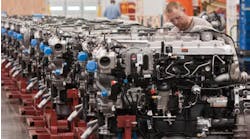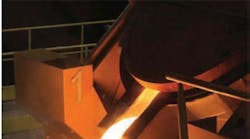Chrysler L.L.C. is implementing a series of moves to curtail output at several of its assembly and powertrain plants, and will discontinue production of four models — all of which will lead to a reduction of 8,500-10,000 hourly positions through the coming year. The privately held automaker also plans to reduce salaried positions by 1,000, contract workers by 37%, and to eliminate hourly and salaried overtime and scale back purchased services as a result of the output cuts.
"We have to move now to adjust the way our company looks and acts to reflect a smaller market," explained Chrysler vice chairman and president Tom LaSorda. "That means a cost base that is right-sized and an appropriate level of plant utilization."
Chrysler recently confirmed a new four-year contract with the United Autoworkers union, which freed the company to proceed with employment reductions. The automaker stated that the output reduction measures are an addition to its Recovery and Transformation Plan (RTP) outlined earlier this year, though it said the objectives of that plan remain in place. The company states it committed in the negotiations to spend over $15 billion on products, plants, and engineering through 2011.
"The market situation has changed dramatically in the eight months since Chrysler established the Recovery and Transformation Plan as its blueprint," stated chairman and CEO Bob Nardelli. "Annual industry volume (U.S. market) then was running at a 17.2 million clip. Now, we expect a seasonally adjusted annual volume for 2007 to be significantly lower and carry over into 2008."
The specific output cuts involved eliminating four models through 2008: the Dodge Magnum, Chrysler PT Cruiser convertible, Chrysler Pacifica, and Chrysler Crossfire. (The automaker points out it will add four models during the same period: Dodge Journey, Dodge Challenger, Chrysler Aspen, and Dodge Durango.)
The manufacturing reductions include eliminating the third shift at the Belvidere (IL) Assembly Plant; the second shift at the Jefferson North Assembly Plant in Detroit; the third shift at the Toledo (OH) North Assembly Plant; the third shift at the Brampton (ON) Assembly Plant; and the second shift at the Sterling Heights (MI) Assembly Plant.
Also, Chrysler's Mack Avenue Engine Plant II in Detroit, which builds Chrysler's 3.7-liter V-6 engine, will return to a two-shift, two-crew operation in the first quarter 2008; it has been operating on a three-crew, two shift schedule. Mack II builds the 3.7-liter V-6 engine.
"I'm confident that we have the right team in place and a business plan that doesn't need to be re-written," stated Nardelli. "Like all good plans, the RTP has built-in flexibility that allows us to stay one step ahead of market change. And that is the way to long-term sustained profitability."



